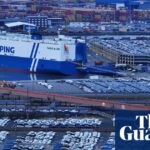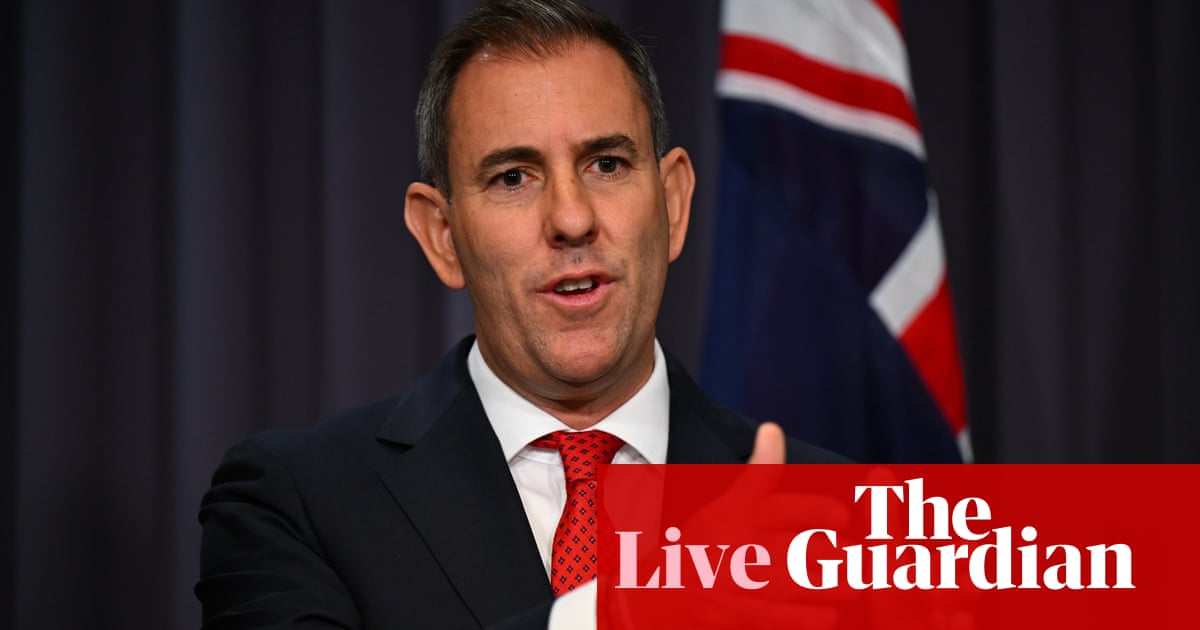Treasurer asks banks to be ‘more reasonable’ so young people with Hecs debts can get home loans
Jim Chalmers has this morning announced the government is changing rules so banks won’t consider student debt when granting home loans.
Home ownership among young people is low. According to the Australian Institute of Health and Welfare, data from August shows the home ownership rate of those born during 1992–96 was 36% in 2021 (when they were aged 25–29), a whole 18 percentage points lower than the 1947–51 cohort at the same age.
So they’ve definitely gone backwards.
AM host Sabra Lane asks Chalmers how many young people have been knocked back due to these rules. He doesn’t have the number but says:
We’ve asked the regulators and the banks to take a more reasonable approach to student debt.
Earlier Sussan Ley was asked about the announcement on Sky News and she didn’t confirm if she supported it:
It taken Jim Chalmers three years to work out it’s really hard to buy a home if you’re a young person … and we do have to make the environment that everyone lives in much more affordable and get the economy back on track.
Key events
CBA posts bumper $5bn half-year profit

Jonathan Barrett
Commonwealth Bank has delivered a bumper $5.13bn half-year cash profit, in a result that has beaten market expectations and threatens to attract political attention amid widespread cost-of-living pressures.
The result, which includes an expansion in profit margins, is up 7% on the preceding six-month period. Australia’s largest bank declared an interim dividend of $2.25 per share, up from $2.15 last year.
The CBA chief executive, Matt Comyn, said he expected a cycle of interest rate cuts would provide some relief to households amid ongoing cost pressures.
The Australian economy has slowed considerably, with cost-of-living pressures continuing to weigh on consumer demand and younger customers in particular making real sacrifices.
However, underlying inflation is now moderating towards the target range and we expect Australia will follow offshore economies with an easing cycle starting in 2025.
The strong profit result will likely draw criticism from Canberra, given Australia’s biggest lender has been able to expand profits at the same time as household budgets are strained.
Comyn told a parliamentary inquiry last year that criticism of business profits “erodes trust in institutions”.
CBA’s accounts show that home loan arrears are now above historical averages, but the bank has described the level of late repayments as “broadly stable”.
CBA shares are a favourite among investors, and have risen 40% in the past 12 months, far outpacing market gains.

Adam Morton
Plibersek urged to protect Indigenous WA rock art from industry
Indigenous leaders, scientists and conservationists are in Canberra to call on the environment minister, Tanya Plibersek, to protect ancient rock art at Murujuga in northern Western Australia from industrial development.
Hosted by the independent MP Kate Chaney, they are particularly focused on an upcoming decision by Plibersek on whether to allow the North West Shelf gas processing facility at Karratha to continue to operate until 2070.
Environmentalists have estimated the new gas fields needed to feed the facility across those decades could lead to 6.1bn tonnes of carbon dioxide emission. The campaign against its approval is equally focused on the impact of local acid pollution on rock art, some of which is estimated to be 50,000 years old.
A report by the group Friends of Australian Rock Art says the rock surface on many monitored Murujuga sites is between 100 and 1,000 times more acidic than background levels. Josie Alec, the Australian Conservation Foundation’s First Nations lead and a Murujuga traditional owner, said of the proposed development:
It would not be allowed to occur anywhere else in the world and it shouldn’t be allowed to continue occurring here.
Woodside, the oil and gas company heading the development, says “research to date on the impacts of emissions on rock art has not been conclusive”.
A decision is due by 28 February.

Emily Wind
Price says Coalition wouldn’t scrap $840m funding for NT communities
Following from the last post…
On the federal government’s funding announcement this week of $840m over six years for remote communities in the Northern Territory, Jacinta Nampijinpa Price said the funding deal would remain under a Coalition government.
We wouldn’t be removing that funding. We’d be ensuring that those programs are ongoing, but as I think I’ve mentioned many times, we would be conducting an audit into federal spending, especially with Indigenous programs in the Northern Territory, which is something that the chief minister has also called for recently.

Emily Wind
Jacinta Price outlines Coalition position on Indigenous affairs if elected
The shadow minister for Indigenous affairs, Jacinta Nampijinpa Price, says the Coalition “wouldn’t go so far as scrapping” Closing the Gap if elected – but would look at “understanding where the actual gap is”.
Speaking with ABC RN just earlier, she said that “over the years, things haven’t changed … for the better” and Indigenous Australians would “absolutely be a focus priority under a Coalition government”.
Asked if a Coalition government would continue the co-design model of the government working alongside Aboriginal organisations through the Coalition of Peaks, Price said “we have to assess everything to see how that is working or isn’t working”.
I think the model definitely needs to be looked at. I don’t necessarily think that it is true to say that only Aboriginal organisations have the capacity to improve the lives of our marginalised.
On how the Coalition would approach treaty or treaties if it wins office, Price said she has “always put it on the public record” she is not in favour of this approach.
I don’t believe that a country can establish a treaty with its own citizens. I think in terms of our nation’s history, we’ve come too far forward.
Trump gave ‘clear signal’ on possible tariffs exemption – Albanese
To a few other issues, the PM is asked for an update on the tariff situation from the US. He gives the same lines that he did yesterday, that they’re under “great consideration”.
President Trump gave a very clear signal yesterday when he said that an exemption for Australia is under great consideration. They’re his words. They’re consistent with the discussion that I had with President Trump.
He’s also asked about an update on electoral reform. That legislation was close to a deal at the end of the last sitting year, before the government pulled it at the eleventh hour. Special minister of state Don Farrell has continued negotiating over summer.
Albanese says he’s hopeful the Senate “will see reason” but that he’s “confident that reform of some basis will be carried by the Senate”.
I think we’re still working on that issue. Don Farrell, the minister, is working hard. He was continuing to have meetings right across the parliament with the crossbenches, with the Coalition. I think that getting big money out of politics and getting more transparency is important, that is Labor’s view.
PM says governments overseas often support airlines
Albanese points to the international market, where other nations have backed or bailed out their airlines, because he says they play a “critical role”.
The reason why governments have intervened in airlines around the world, whether you look at Singapore, in [Germany], Lufthansa, as well as of course the Middle Eastern airlines are all connected with their governments, whether it be Emirates, Etihad, Qatar, Gulf Air, these are all connected. There’s a reason for that. Because aviation plays a critical role in communities.
He says Rex’s expansion into the Sydney to Melbourne route left the government with a “financial mess”.
Labor to work on ‘incentives package’ for potential Rex buyers
Catherine King says the second sales process for Rex will begin this month to try to find the airline a buyer.
The infrastructure minister says Rex is the “backbone” of connectivity for regional areas.
What has become evident through the failure of the first sales process is that without government support, a second sales process is unlikely to be successful. So what we’re announcing today is that we will, and have worked with the administrators, and we will work via the sales agents and my department, is that we will have a competitive process for the bidding for this new for this airline, and that my and that my department will work with success for bidders on an incentives package from the commonwealth government.
There are a few elements to that incentives package.
The government says that includes a waiver of the “use it or lose it” test for Rex regional flight slots at Sydney airport, which will ensure its access to those slots until 24 October 2026.
It also follows a loan for Rex of up to $80m to keep Rex’s regional routes operating to 30 June 2025, and acquiring $50m of debt from Rex’s largest creditor, earlier this year.
‘Not left behind’: PM provides Rex update
Anthony Albanese is speaking from Merimbula in NSW, with infrastructure minister Catherine King, discussing the government’s consideration to purchase Rex airlines.
We will work with the shortlist of bidders to maximise a successful sale and … provide support to bidders.
This will be contingent on commitments to provide an ongoing reasonable level of services to regional and remote communities.
Albanese says again that if those negotiations for sale don’t come through, the government will work with state governments and consider contingency plans including commonwealth acquisition.
Albanese says Rex is an “incredibly important airline”:
We’re determined to make sure that regional communities are not left behind. It’s a core commitment that I make.
Trump tariffs an insult? ‘I wouldn’t use those words,’ treasurer says
Chalmers is continuing his media appearances down the parliamentary corridor. He’s on ABC News Breakfast now, talking trade and Trump.
The lines that the government is using are tight – they’re very focused on the call being “productive” and “positive” and not straying from the words that the US is willing to consider exemptions for Australia.
He’s asked whether he agrees with Democratic representative Joe Courtney, who yesterday called potential tariffs on Australia an “insult”.
I wouldn’t use those words, no. I know Joe Courtney, I’ve met him on a couple of occasions. He’s a wonderful guy and a great friend of Australia. But we don’t necessarily see it that way.
What Prime Minister Anthony Albanese was able to do yesterday was to point out how mutually beneficial this economic relationship is, how close we are as partners in the economy, in national security, and in other ways. We obviously don’t take any outcomes for granted here, but it was a good, productive and positive conversation between the two leaders yesterday.

Ben Doherty
PM and Trump talked ‘mutually beneficial trade’ – US
The White House has released a ‘read-out’ of prime minister Anthony Albanese’s phone call yesterday with US president Donald Trump.
The White House said:
President Donald J Trump spoke with prime minister Anthony Albanese of Australia. Among other topics, they discussed cooperation on US and Australian defence industrial capacity, mutually beneficial trade and investment, resilient critical mineral supply chains, and concerns about China’s aggressiveness.
The leaders emphasised their commitment to advancing the US-Australia alliance and upholding a free and open Indo-Pacific.
“Mutually beneficial trade” is a phrase that will be forensically parsed in the days ahead, with mixed signals emerging from the Trump White House over whether Australia would be exempt from newly imposed steel and aluminium tariffs.
Trump signed an executive order on Monday, imposing 25% tariffs on all steel and aluminium imports, saying they would apply to all countries with “no exemptions, no exceptions”.
But he then said he was giving “great consideration” to carving Australia out of the tariff regime.










